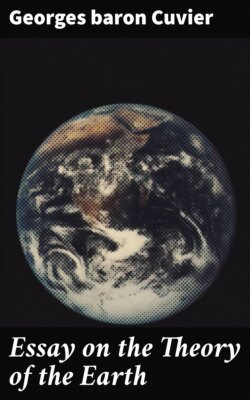Читать книгу Essay on the Theory of the Earth - Georges baron Cuvier - Страница 5
На сайте Литреса книга снята с продажи.
ОглавлениеESSAY
ON THE
THEORY OF THE EARTH.
PRELIMINARY OBSERVATIONS.
Table of Contents
In my work on Fossil Bones, the object which I proposed was to discover to what animals the osseous remains, with which the superficial strata of the globe are filled, may have belonged. In pursuing this object, I had to follow a path in which but little progress had hitherto been made. As an antiquary of a new order, I was obliged at once to learn the art of restoring these monuments of past revolutions to their original forms, and to discover their nature and relations; I had to collect and bring together in their original order, the fragments of which they consisted; to reconstruct, as it were, the ancient beings to which these fragments belonged; to reproduce them with all their proportions and characters; and, lastly, to compare them with those which now live at the surface of the globe:—an art almost unknown, and which presupposed a science whose first developments had scarcely yet been traced, that of the laws which regulate the co-existence of the forms of the different parts in organised beings. I had therefore to prepare myself for these inquiries, by others of a far more extensive kind, respecting the animals which still exist. Nothing, except an almost complete review of creation in its present state, could give a character of demonstration to the results of my investigation into its ancient state; but, from this review, I had at the same time to expect a great body of rules and affinities not less satisfactorily demonstrated; and it became obvious, that, in consequence of this essay upon a small portion of the theory of the earth, the whole animal kingdom would necessarily be in some measure subjected to new laws.
Thus I was encouraged in this twofold investigation, by the equal interest which it promised to possess, both with regard to the general science of anatomy, the essential basis of all those which treat of organised bodies, and with regard to the physical history of the globe, the foundation of mineralogy, geography, and even, it may be said, of the history of Man, and of all that it most concerns him to know with regard to himself.
If it be so interesting to us to follow, in the infancy of our species, the almost obliterated traces of extinct nations, why should it not also be so, to search, amid the darkness of the infancy of the Earth, for the traces of revolutions which have taken place anterior to the existence of all nations? We admire the power by which the human mind has measured the motions of the celestial bodies, which nature seemed to have concealed for ever from our view. Genius and science have burst the limits of space; and observations, explained by just reasoning, have unveiled the mechanism of the universe. Would it not also be glorious for man to burst the limits of time, and, by means of observations, to ascertain the history of this world, and the succession of events which preceded the birth of the human race? Astronomers have undoubtedly advanced more rapidly than naturalists; and the present period, with respect to the Theory of the Earth, bears some resemblance to that in which some philosophers fancied that the heavens were formed of polished stones, and that the moon was of the size of the Peloponnesus; but after Anaxagoras, came Copernicus and Kepler, who pointed the way to Newton; and why should not natural history also one day have its Newton?
